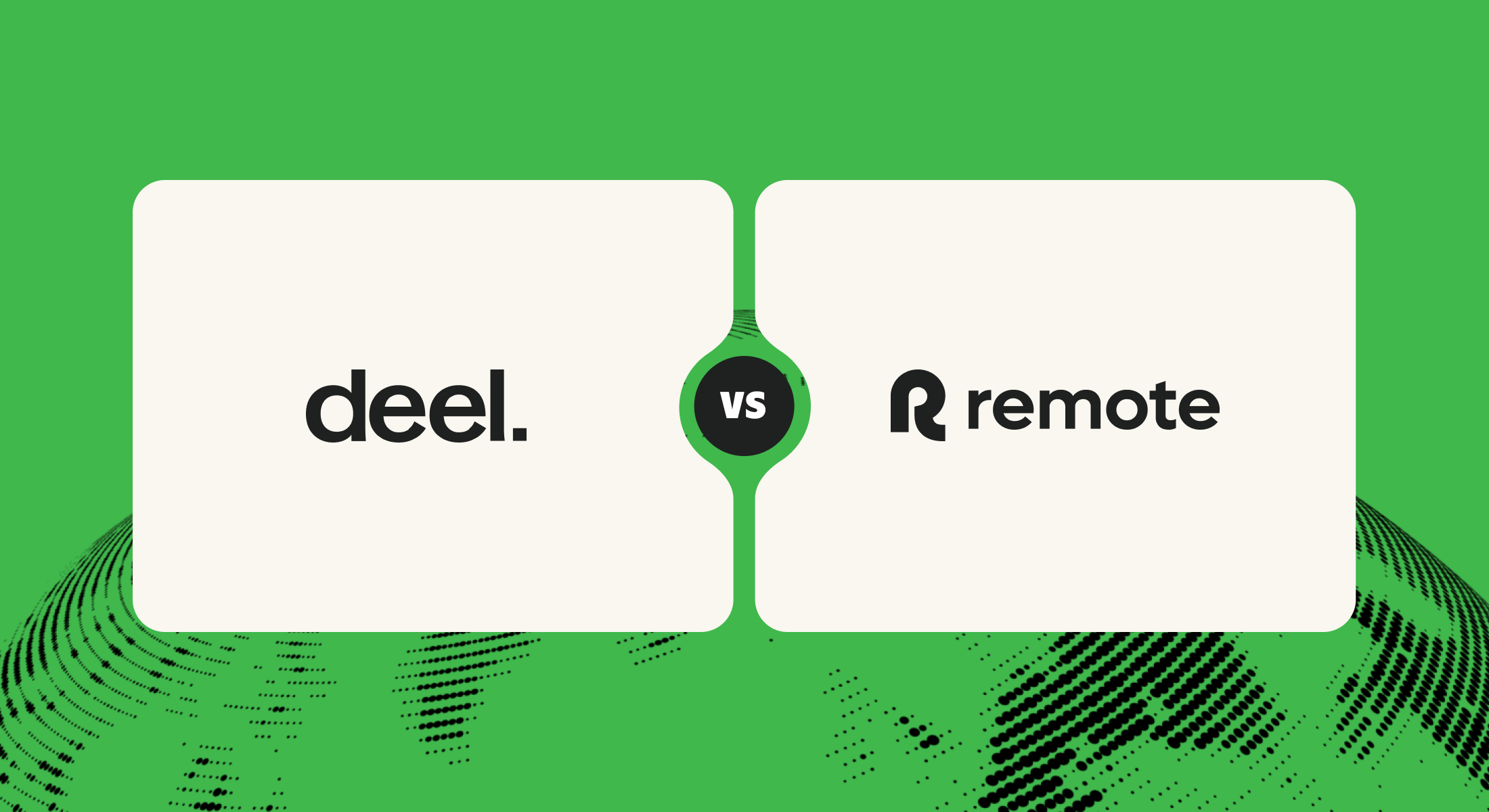If you're growing your team or expanding into new markets, you've likely come across the terms “Employer of Record” (EOR) and “Professional Employer Organization” (PEO).
However, while both types of organizations offer support with HR, payroll, and benefits administration, they serve different purposes and operate under distinct legal structures, so it’s important to determine which is best for your business.
Below we’ll explore the core differences between the EORs and PEOs, outline key use cases, and help you determine which model is the best for your company.
What Is an EOR?
An Employer of Record (EOR) is an organization that helps companies expand internationally by hiring and paying employees on behalf of another company. EORs assume the responsibility for all formal employment tasks, including onboarding processes, compliance documentation, international payroll, and more.
Using an EOR allows companies to legally and efficiently hire workers in other countries without having to set up a local entity or risk violating local employment laws. However, the company itself handles the day–to-day management of its international hires.
These are some of the benefits of partnering with an EOR:
- Streamlined global hiring: Hire employees in new countries quickly without setting up a local entity.
- Access to the world’s top talent: Expand your talent pool by hiring without geographic restrictions.
- Legal compliance: Ensure adherence to each individual country’s local labor laws, tax regulations, and employee classification regulations.
- Simplified payroll and taxes: An EOR manages local payroll processing, tax withholdings, and contributions on your company’s behalf.
- Benefits management: Provide country-specific employee benefits, such as healthcare, annual leave, and pensions.
- Compliant employment contracts: EORs draft contracts that align with local employment laws and cultural norms.
- Reduced legal risk: Minimize the risk of noncompliance, fines, or legal disputes related to international employment.
The ease of working with an EOR for global expansion is why the EOR market is predicted to reach USD 8.59 Billion by 2030.
Think this is the solution for your company? Here are six things to look for in an EOR.
What Is a PEO?
A Professional Employer Organization (PEO) is a company that businesses use to manage and outsource their HR services. Typically, a PEO handles all human resource responsibilities, including payroll and benefits administration on behalf of a business.
Many employers, especially small and mid-size businesses, struggle to find enough time and resources to focus on all the functions related to employee management.
This is also the case with companies that operate remote teams, where HR functions can become increasingly complex if hiring abroad. In these cases, a business can opt to outsource its HR functions to a POE to streamline its operations in countries where they have a legal entity.
These are some of the benefits of working with a POE:
- Co-employer: A PEO becomes a co-employer, handling HR responsibilities while you retain day-to-day control of your employees.
- Simplified payroll and taxes: The PEO manages payroll processing, tax withholdings, and compliance with local tax laws.
- Access to better benefits: PEOs often provide access to large-group health plans and other employee benefits at more competitive rates.
- HR compliance and risk mitigation: A POE’s expertise ensures companies are compliant with labor laws, workplace regulations, and employee classification standards.
- Documentation support: Get assistance developing legally compliant employee handbooks, workplace policies, and more.
- Recruitment and onboarding support: Many PEOs offer tools and assistance for hiring, onboarding, and managing employee engagement.
Here’s what to look for in a PEO.
Key Differences Between EOR and PEO Services
While both PEO and EOR services offer a similar level of service and cost-efficiency for businesses outsourcing their HR needs, their subtle differences lie in these key areas:
1. Structure
An EOR allows you to manage employees across many countries while keeping your business registration limited to your home country. Meanwhile, a PEO requires you to register your business in every country where you plan to hire.
Also, with an EOR, you relinquish some control over HR-related decisions because the EOR is the legal employer. But with a PEO, you maintain authority over all HR decisions, while the PEO actually conducts them.
2. Compliance
A PEO doesn’t actually employ workers on behalf of a company like an EOR does. Because of this, companies working with a PEO are still responsible for adhering to all local labor laws.
Meanwhile, an EOR has the legal and HR expertise to handle these responsibilities in other countries on behalf of the company they’ve partnered with and provide a variety of services, including payroll processing and tax compliance, benefits administration, HR support, and more.
3. Risk
Because an EOR is the actual employer of your distributed employees, the EOR assumes all employment risks. However, a PEO is a co-employer, meaning that your company assumes all risk for potential liabilities like workplace safety.
4. Size and scale
Because PEOs serve as co-employers, they might require a minimum number of employees and may provide more value for companies with several employees, especially full-time vs. temporary ones.
On the other hand, EORs don’t usually have a minimum number of employees they have to work with, so they can be contracted for as little as one or two employees. This is because EORs are typically used for remote candidates or temporary employees.
5. Cost
Both EORs and PEOs tend to structure their rates in a similar manner; however EORs typically have lower long-term costs because EORs cover insurance and benefits on behalf of your workforce.
6. Benefits
EORs and PEOs both provide benefits packages. However, the key difference is that the employer chooses whether to offer a benefits package via an EOR, whereas a PEO typically requires it. And PEOs can often provide access to more benefits options.
EOR vs. PEO: Which Is the Right Service for Your Business?
Choosing between an EOR or a PEO as a solution to outsource your HR functions depends on what kind of business you have.
Here are scenarios that may help you decide:
You have employees in multiple countries.
If your company operates in multiple locations with different tax laws, it can be difficult to stay up to date on filing requirements. EORs are especially helpful in this case if you need to employ workers in places where your company doesn’t have a legal presence.
For example, if your company is based in Canada and you’re hiring an employee located in Nigeria. The EOR can also provide the infrastructure needed to start hiring people in another country, acting as the employer until you are ready to establish a legal entity there.
You need a cost-effective way to provide employee benefits.
A PEO helps small and medium-sized businesses provide the same employee benefits packages offered by larger companies, which can make your company’s benefits offerings more competitive.
Your company is a startup or a gig-economy company with freelance workers and/or international contractors.
In this case, an EOR is a good choice because you can quickly add or remove employees from the payroll without having to go through the long-term contract process of a PEO.
EORs are extremely useful for companies that want to hire people for a limited period of time or only for certain projects.
You have a small business in one country but want to hire internationally.
Let’s say you run a United States-based business and want to hire international workers. In this scenario, it may be a good idea to leverage both a PEO for your U.S. team and an EOR for your global team.
What works better for international employees?
Clearly, both EORs and PEOs offer valuable HR services, such as managing payroll, handling benefits, and ensuring compliance with local labor laws, but the right choice for your company depends on your business setup and global goals.
If your company doesn't have a legal entity in the country where you're planning to hire, then an EOR is typically the better fit. An EOR acts as the legal employer of your international hires, handling all compliance responsibilities and administrative duties while you manage the employees from day to day.
This makes EORs a popular choice for businesses testing new markets or hiring just a few employees abroad without the need to establish a full local presence.
PEOs, on the other hand, require that you already have an entity in the country where you’re hiring employees. Under the PEO’s co-employment model, you’ll share HR responsibilities — but only if your company is already legally established there.
Some providers may label themselves as "global PEOs," but if they require you to open an entity before hiring, they don’t actually provide true EOR services.
In short, if flexibility and cost-efficiency are your priorities, especially in countries where you don’t have a legal entity, an EOR is likely the better choice as PEOs are better suited to companies already committed to a long-term presence in a particular region.
Frequently Asked Questions About EORs vs. PEOs
Q: What is a PEO provider?
A: A PEO provider refers to a Professional Employer Organization that offers full-service HR outsourcing to businesses. This arrangement is typically known as a joint-employment or co-employment relationship.
Q: What is an EOR provider?
A: An EOR provider acts as an employer on behalf of a company hiring employees in countries where that country isn’t registered.
Q: How can I hire a worker in a country where my business has no establishment?
A: The solution for most companies involves opting for an EOR service that will employ workers on the company’s behalf.
Q: How can I provide benefits for my small-business employees in my home country?
A: Opting for a PEO means you can outsource your HR department to a professional employer organization in countries where you already have an established legal presence.
Choosing the Right Global Employment Solution
Expanding your workforce across borders is an exciting step for any business, but as we’ve outlined, navigating international employment laws, benefits, and payroll can be complex. And EORs and PEOs both offer different pathways to support your business.
Ultimately, the right choice depends on your business model, hiring goals, and global expansion strategy.
If you’re looking for an EOR, look no further than RemoFirst. Our all-in-one platform allows companies to employ workers in 185+ countries and to manage and pay contractors in 150+ countries.
Book a demo to learn more.




















